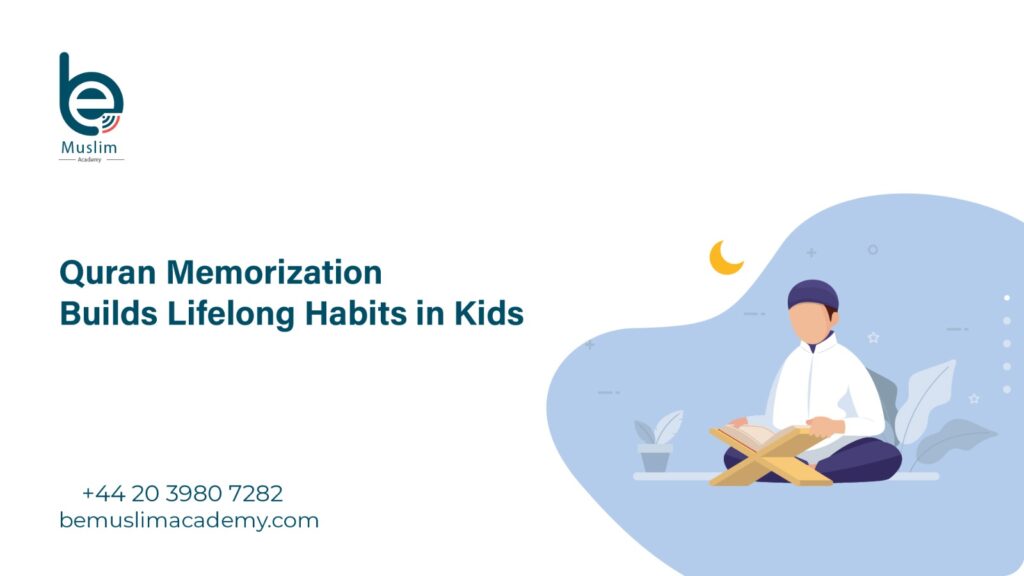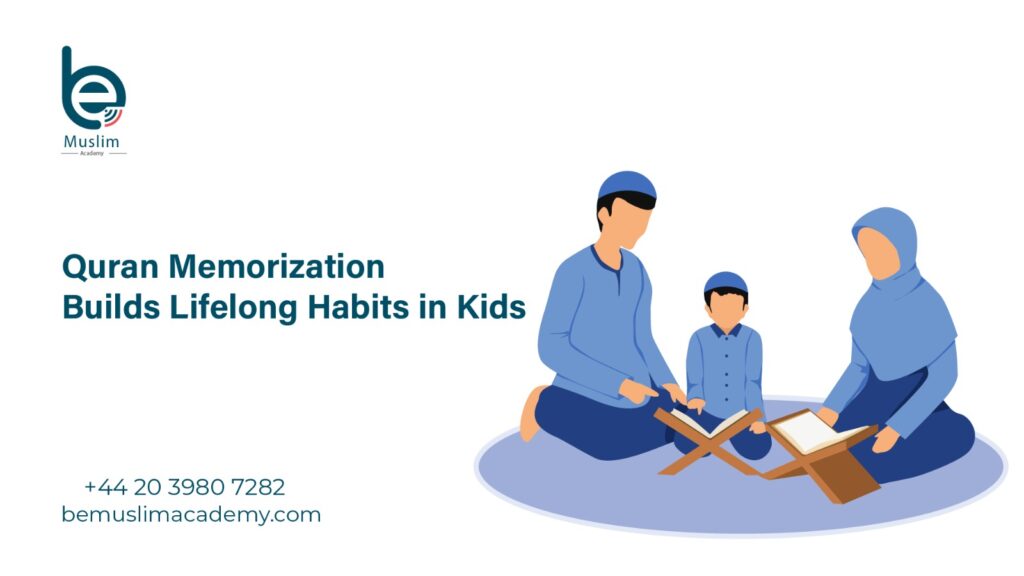Introduction: Why Quran Memorization for Kids Is a Life-Changing Gift
Quran memorization for kids is more than a religious achievement — it’s a sacred journey that shapes the soul, the mind, and the heart. For Muslim parents, helping a child become a Hafidh or Hafidha (one who has memorized the Quran) is one of the greatest acts of love, faith, and legacy.
In a world filled with distractions and fleeting trends, Quran memorization for kids anchors children in divine guidance, cultivates discipline, and builds an unbreakable connection with Allah ﷻ. It becomes a source of confidence, inner peace, and spiritual clarity from a young age.
In this three-part guide, we’ll explore seven powerful benefits of Quran memorization for kids that every Muslim parent in the modern world should know. From boosting brain power to nurturing Islamic identity, this journey is one your family will cherish for life.
1. A Deep Spiritual Connection with Allah
When a child memorizes the words of Allah, they don’t just learn — they internalize. Every verse, every word becomes a source of light in their heart.
- Closeness to Allah: Memorizing the Quran helps children feel spiritually connected, even when they are young.
- Stronger faith foundation: It anchors their Islamic identity during the most formative years of life.
- Barakah (blessings): A home with a child who recites and memorizes Quran is filled with tranquility, mercy, and divine blessings.
“The best among you are those who learn the Quran and teach it.” — Prophet Muhammad ﷺ (Bukhari)
This isn’t just about education. It’s about giving your child the greatest treasure: the living words of the Creator.
2. Cognitive Development and Academic Excellence
Studies have shown that Quran memorization significantly enhances a child’s brain function. Here’s how it helps with school and learning:
- Improved memory: Memorizing large portions of text develops a sharp, agile memory.
- Better focus and attention span: Children who engage in Hifz often develop strong concentration skills.
- Enhanced verbal and auditory processing: Reciting the Quran improves language skills and pronunciation.
A 2013 study by the International Islamic University Malaysia found that students who memorized parts of the Quran performed better academically due to higher cognitive retention and discipline.
This isn’t surprising. Memorization trains the brain like a muscle — and the Quran is the most powerful workout.
3. Discipline, Patience, and Consistency
Quran memorization teaches children the value of persistence and routine.
- Daily review builds habit: Memorizing the Quran requires repetition, practice, and review — all of which teach discipline.
- Small goals, big impact: Learning bit by bit over time shows children that consistency pays off.
- Coping with frustration: Children develop emotional resilience when they experience slow progress and learn to overcome it.
The process of memorization becomes a powerful teacher. It shows children that rewards come not just from achievement, but from the effort itself.
Children who learn to stick with Quran memorization often apply the same dedication to school, chores, and other responsibilities.
4. A Lifelong Gift That Grows with Them
Unlike toys or technology, the Quran doesn’t expire or become outdated. Its words will stay with your child forever, guiding them through:
- Adolescence: When identity crises hit, the Quran will be their moral compass.
- Adulthood: The spiritual and emotional grounding from Hifz will help them build strong families and careers.
- Difficult times: During grief, confusion, or loneliness, Quranic verses will be their anchor.
“Indeed, it is We who sent down the Qur’an and indeed, We will be its guardian.” — [Surah Al-Hijr, 15:9]
When the world changes, the Quran remains unchanged — a source of strength and serenity for life.
5. A Source of Honor for Parents
Quran memorization doesn’t just benefit the child — it uplifts the entire family.
- Spiritual rewards: According to hadith, parents of a Hafidh will be crowned on the Day of Judgment.
- Respect in the community: A family that nurtures Quran in their home earns admiration and honor.
- Parental pride: Witnessing your child recite the Quran fluently is a joy and blessing beyond words.
Imagine the Day of Judgment — when a parent is honored because they raised a child who memorized the Book of Allah. That’s a legacy no money can buy.
6. Building Islamic Confidence
Kids who memorize the Quran develop a sense of pride in their faith.
- Leadership skills: They become role models in their schools, mosques, and communities.
- Resisting peer pressure: With strong Islamic identity, they’re less likely to be swayed by harmful influences.
- Public speaking: Reciting in front of others boosts their confidence and communication skills.
Children who engage with the Quran regularly feel spiritually empowered. They’re confident in who they are and where they come from — something every Muslim parent dreams of.
7. Creating a Daily Bond with the Quran
When children memorize the Quran, they build a consistent habit of engaging with it every day.
- Morning routines: A few verses before school helps set a positive tone.
- Evening reflection: Reviewing before bed reinforces memory and calms the mind.
- Weekend memorization: Allows families to bond and practice together.
This consistent connection makes the Quran part of their daily rhythm — not just something for Ramadan or special occasions.
Final Thoughts for Part 1
Quran memorization for kids is one of the most powerful investments you can make in your child’s future. It’s not just about learning words — it’s about shaping hearts, minds, and souls for the better.
From stronger faith and family unity to academic excellence and emotional resilience, the benefits are endless.
In the next part, we’ll explore how to make this journey easier, the best teaching methods, and how modern tools like online classes are transforming the Hifz experience for families around the world.

How to Help Your Child Start Quran Memorization the Right Way
1. Set Clear Intentions and Goals
Before your child begins the journey of Quran memorization for kids, it’s essential to ground their effort with sincerity (ikhlas) and purpose. Teach your child that memorizing the Quran isn’t just about repeating words — it’s about connecting with Allah (SWT) and earning His pleasure.
🟢 Encourage them to:
- Make du’a before each session
- Understand they are carrying the words of Allah
- See Quran memorization as an honor, not just a task
As a parent, set measurable goals. Examples:
- Memorize Juz Amma in 3 months
- Master 1 page per week with tajweed
- Review 2 surahs daily
2. Establish a Consistent Routine
Consistency is key to success in Quran memorization for kids. A clear, daily schedule ensures the child develops strong habits and reduces stress.
✅ Tips for setting up the routine:
- Choose a distraction-free time (e.g., after Fajr or before Maghrib)
- Keep sessions short but consistent (20–30 minutes daily)
- Avoid skipping days — even weekends
A consistent pattern reinforces memory and makes the memorization process feel natural, not forced.
3. Choose the Right Quran Teacher
A skilled teacher is one of the most important elements in your child’s success. When choosing an instructor for Quran memorization for kids, prioritize:
- Certified teachers with ijazah
- Experience teaching children
- Patience and good communication
- Fluency in Arabic and your child’s native language (e.g., English or Urdu)
💡 Online academies like Be Muslim Academy offer live sessions with specialized teachers for children.
Why a good teacher matters:
- They correct mistakes early before they become habits
- They build motivation and structure
- They create a bond of respect and trust
4. Use Visual and Auditory Memory Techniques
Every child learns differently. Some children respond better to visual methods, while others excel through hearing.
👀 Visual tools:
- Color-coded mushaf (highlight rules of tajweed)
- Flashcards with surah names and keywords
- Whiteboard for writing and rewriting verses
👂 Auditory methods:
- Repeating after a Qari (e.g., Mishary Alafasy)
- Recording the child’s recitation for review
- Listening to one verse on loop before repeating
Combining both styles makes Quran memorization for kids more effective and engaging.
5. Focus on Understanding Meaning
Even if the child doesn’t speak Arabic fluently, introducing the basic meanings of verses makes the memorization more meaningful.
🎯 Techniques to teach understanding:
- Use child-friendly Quran translations (e.g., Saheeh International)
- Share simple tafsir stories (e.g., why Surah Al-Fil was revealed)
- Link verses to their lessons: “Allah sees everything” – Surah Al-Alaq
This approach builds spiritual connection, which enhances memorization.
6. Repetition and Revision Are Essential
Memorization is not about memorizing once — it’s about repetition. The Prophet ﷺ said, “The example of the one who memorizes the Quran is like the owner of a tied camel. If he is vigilant, he will keep it; if he lets it go, it will escape.” [Bukhari]
📌 Suggested method:
- Daily new memorization (sabaq): 3–5 lines
- Daily recent revision (sabaqi): previous 2–3 pages
- Long-term review (manzil): previously completed surahs/juz
Without repetition, kids quickly forget. The system of sabaq + sabaqi + manzil is widely used in madrasahs for effective Quran memorization for kids.
7. Reward Progress and Celebrate Milestones
Kids thrive on encouragement. Recognize small wins and big milestones alike. This motivates them to stay on track and build love for the Quran.
🎁 Ideas:
- Give stickers or stars for each surah memorized
- Celebrate finishing Juz Amma with a cake or a family gathering
- Create a “Quran Wall of Fame” at home
Make Quran memorization for kids feel special. The positive reinforcement leaves a long-lasting impact.
8. Limit Screen Time and Distractions
To improve focus, it’s important to reduce exposure to digital distractions.
📱 Set clear boundaries:
- No screens before/after Quran time
- Use digital Quran apps only for learning
- Set app timers to avoid prolonged gaming or videos
Encourage a quiet space for memorization. If possible, dedicate a small prayer or Quran corner with calm decor, books, and a mushaf.
9. Be Patient and Supportive
Quran memorization is a long journey. Every child progresses at their own pace. Some will take longer with certain surahs. It’s completely normal.
💬 Say things like:
- “I’m proud of how hard you’re trying”
- “It’s okay if you forget, we’ll try again tomorrow”
- “The reward is with Allah, let’s do our best together”
Avoid comparing your child to others. Every journey is unique.
10. Involve the Whole Family
When the whole family participates in Quran memorization, it becomes easier and more enjoyable for the child.
🕌 Ideas:
- Have Quran time after dinner for the whole family
- Older siblings review with younger ones
- Parents memorize short surahs too
This transforms Quran memorization for kids into a shared spiritual experience and fosters love for the Quran in the home.
Common Mistakes to Avoid
- Overloading the child – Stick to manageable chunks of memorization.
- Skipping revision – Revision is more important than new memorization.
- Inconsistent scheduling – Irregular sessions break momentum.
- Lack of understanding – Meaningless repetition is quickly forgotten.
- Being too strict – This may cause burnout or fear of Quran learning.
Motivation Through the Words of the Prophet ﷺ
The Prophet Muhammad ﷺ said:
“The best of you are those who learn the Quran and teach it.”
— [Bukhari]
Remind your child of this hadith often. Help them see their efforts as part of something noble and eternal. Every verse learned brings them closer to Allah (SWT) and contributes to a lifelong relationship with His book.

Quran Memorization for Kids: Nurturing Faith, Focus, and Discipline
Developing Lifelong Habits Through Memorization
Quran memorization for kids is more than just a religious task — it cultivates self-discipline, time management, and responsibility from a young age. This structured activity forms the foundation for lifelong learning and spiritual growth.
Parents who guide their children to recite and revise daily are planting seeds of consistency and resilience. Children who develop these habits are more likely to stay committed to their faith and succeed in school and life.
Recommended resource: Why Memorize the Quran
Emotional Connection Between Parent and Child
Parents and children who study the Quran together build deeper emotional and spiritual bonds. Reviewing a Surah before bedtime or listening after Fajr becomes more than a lesson — it becomes a meaningful family ritual.
It transforms parenting into a legacy of light. Even if a child memorizes just one Ayah each day, it’s a step toward building a home filled with barakah.
Internal resource: Learn to Read Quran in 5 Easy Steps – Be Muslim Academy
✅ This internal link encourages further engagement and keeps users on your site.
Boosting Confidence Through Achievement
Children feel proud when they complete a Surah. Their confidence grows, and they begin to see themselves as capable and spiritually mature. This sense of accomplishment helps them resist negative peer pressure and gives them strong moral grounding.
As a result, Quran memorization for kids doesn’t just shape the heart — it shapes character, resilience, and values.
Tools That Make Memorization Easier Today
Modern technology has made memorizing Quran easier than ever:
- Use apps like Tarteel for verse tracking
- Benefit from YouTube playlists with child-friendly Tajweed
- Join online Hifz programs for structured progress
✅ For example: Quranacademy.io
These tools combine traditional learning with modern engagement, making the process fun and sustainable.
Final Advice for Parents
Begin with short Surahs and encourage daily review. Consistency is key — not speed. Make du’a regularly and trust the process. Your child’s journey with the Quran is a lifelong path full of blessings, reward, and light.
Summary
✅ Quran memorization for kids builds discipline, faith, and confidence.
✅ It creates a strong bond between parents and children.
✅ Tools like apps and structured courses make learning more accessible.
✅ Internal and external links provide added value for SEO and reader engagement.







